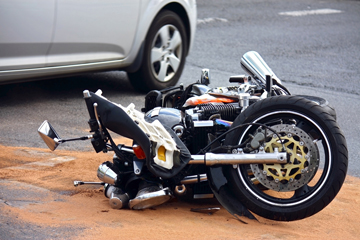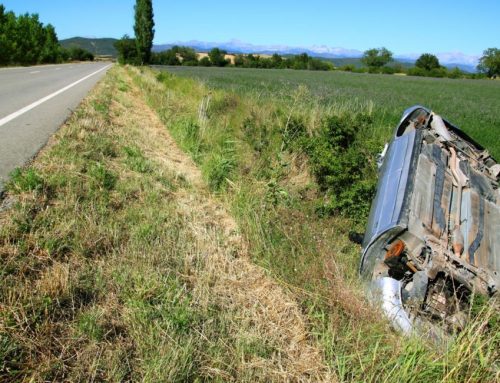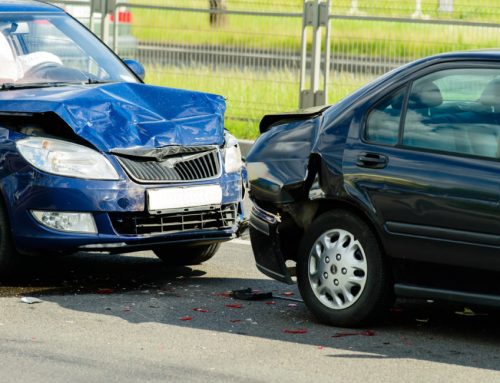John Maher: Hi, I’m John Maher, and today I’m speaking with Russell Guest and Richard Allen of Guest & Brady, a personal injury law firm in Greenville, South Carolina. Today we’re going to be talking about motorcycle accidents versus car accidents. Russell and Richard, welcome.
Russell Guest: Good afternoon, John. This is Russell, here, pleasure to be here today.
Richard Allen: Hey, John. This is Richard. Good to see you.
Motorcycle Accidents vs. Car Accidents – The Major Differences
John: Thanks. What are the major differences between car accidents and motorcycle accidents?
Russell: There are a number of issues that come into play when we’re talking about motorcycle accidents vs. car accidents. There is commonly, between the two, property damage and injuries that occur, and also fault.
We have to work on, as an attorney, establishing each of those points. Not all the time does a person readily admit that they are at fault in an accident. Oftentimes, whenever there is an accident involving a motorcycle, the severity of the injuries is much greater than it is in an auto accident.
In some of the most recent cases I’ve had, there’s been head injuries and also broken bones, in a motorcycle accident that you would not have seen had it been an auto accident or a car accident. That is one of the issues that is of primary concern.
Also, property damage. Property damage absolutely can be severe and costly in an automobile accident, but whenever there’s a motorcycle, most often the motorcycles are totaled. Then it becomes an issue of what the value of the actual motorcycle is or the repair value of the motorcycle versus the total value of the car.
We often find that property damage becomes more of an issue in totaling the motorcycle, in those instances, versus a car accident.
Motorcycle Accidents vs. Car Accidents – Which Costs More?
John: Are motorcycle accidents more costly than car accidents?
Richard: Hey John, this is Richard. Because of the lack of a safety cage, or safety barrier, on the actual motorcycle itself, I think it’s fair to say that you’re more likely to suffer severe injuries in a motorcycle accident.
Depending on the degree of injury, the degree of disability, and lasting symptoms, and in effect, the medical care or the ongoing treatment, it can be extremely expensive. It, number one, derives from the safety or lack of safety features that you see on a motorcycle versus a vehicle.
One thing that we’ve come across is the UIM or underinsurance coverage. In a recent experience, we were looking at a declarations page, and one thing we’ve talked about is the relative inexpensive UIM coverage for a motor vehicle is relatively inexpensive.
That’s different from a motorcycle. We found, in fact, it’s considerably more expensive, and a lot of that may go into the risk analysis that these insurance companies use to set premium rates. Bottom line, it should not deter someone who is thinking about purchasing a motorcycle from getting the UIM coverage.
In reality, while it is more expensive, it is absolutely critical, and we would offer, just from the safety standpoint, that you can’t afford to ride a motorcycle or buy a motorcycle without purchasing UIM coverage.
John: Remind us. The underinsurance coverage will cover you for any amount of your medical bills and things like that that might add up that are over and above however much insurance the person who perhaps caused the accident has.
Richard: Correct. If someone hits you, and they are carrying for instance, the minimum limits on liability coverage required in South Carolina, which is $25,000, and let’s say your medical bills exceed $25,000, then that’s where the benefit is in you having the UIM coverage.
It would pay the excess, and there is a strong likelihood that if you’re in a motorcycle accident, you’re going to have more than $25,000 in medical care.
John: Because the injuries tend to be more severe.
Richard: Right.
Motorcycle Accidents vs. Car Accidents – Bringing Forward a Claim
John: How is the process of bringing forward a claim for a car accident the same as a motorcycle accident, or how is it different?
Russell: John, this is Russell. I just wanted to add another point to that last statement. In regards to using the UIM coverage, or the underinsured coverage, a person who causes the accident is legally responsible for all the damages, even despite them having only $25,000 in coverage.
It is not a wrong presumption by people in the community to know that the person who caused that accident is absolutely responsible for the total damages. That’s the legal argument.
The problem with that is why you have to purchase underinsurance coverage. You have to protect yourself, because most likely in 99% of the cases, the person who caused the injury has no ability other than the actual coverage on the vehicle to be able to pay more than the coverage that they had.
If your medical bills were all of a sudden $100,000 or $200,000 for the surgeries and treatment that you received, and the person only has $25,000 in coverage, yes, they’re responsible for the total damages, but they have no ability to pay it. That’s why you’ve got to protect yourself with underinsurance.
It’s everyone’s obligation to protect themselves by purchasing that underinsurance coverage.
Let me also add that there are some statistics out in South Carolina dealing with highway fatalities. Through today, 2015, the South Carolina road deaths are up significantly this year, and motorcycle deaths are way up.
Through this past Sunday, 572 people have died on South Carolina roadways, compared with 473 for the same period last year. That’s an increase of 101 extra people who have died on South Carolina roadways, just through yesterday’s date.
Of that number, 88 were motorcyclists, up from 57 the same time period last year, an increase of more than 54%.
We talk about protective gear, and the things we might be able to do to prevent injury, and in those instances, 8 out of 10, or 80% of the people involved in a motorcycle accident, the helmet did not stop them from being killed, or they were not wearing it, because South Carolina law allows for people to ride without a helmet, and most of them choose to do so, which is clearly a mistake.
Death is another one of those injuries that can happen, of course, that are severe, and really devastating to a family.
In talking about how the bringing claims [forward] might be different, motorcycle accidents often involve an instance where you’re not actually making collision with a car.
It becomes a single‑vehicle accident, in terms of the injury and the collision. You have to have a witness, oftentimes, to help with those. There can be a John Doe case where the person who caused the injury ran into your side of the road, and then you tried to avoid it by going off the roadway, and they speed away.
That person becomes known as a John Doe. In South Carolina, you have to have some collision, or a witness, to be able to preserve that claim or even bring that claim [forward]. The purpose for that policy is to prevent fraud from people just having a single vehicle accident and making a claim that’s just not true.
It really hurts and is really difficult, in some instances, to bring a John Doe claim without having a witness.
At a recent accident that we were involved in, or at least were helping with, where a trash truck or government entity was pulling out of a roadway and making a sharp turn to the right, as he pulled out of his lane, he looped into the oncoming traffic lane to make that hard right, and he failed to yield the right of way to the oncoming motorcycle.
That oncoming motorcycle avoided that collision of the truck. It went off onto the side of the roadway, and [the rider] ended up fracturing multiple bones and having significant disability.
Fortunately, in that case, because the trash truck driver was denying that he had any responsibility, there was a witness who was behind the trash truck who said, “No, that trash truck absolutely came out into the lane in front of that motorcycle. It was clearly that trash truck driver’s fault.”
That was fortunate, in that case, that we were able to get that information. Bringing a claim can be different, in that respect, in a motorcycle versus a car, because the facts are often more difficult for the motorcyclist to bring [forward].
That’s one instance that will be helpful, as far as what are some of the differences between the motorcycle and the car accident.
John: That’s great information. Russell and Richard, thanks again for speaking with me today.
Russell: Thank you, John.
Richard: Thanks, John.
John: For more information about Guest and Brady, visit their website at guestbrady.com, or call 800‑903‑8101, or 864‑233‑7200.






